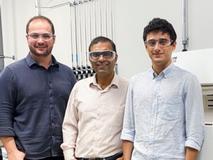CHF 40,000 for CO2 capture at the source, a software for robotic material handling, and advanced AI diagnostics
26.01.2024
Divea, Flink Robotics, and Med4Cast were selected at Venture Kick's second stage of financial and entrepreneurial support. Their projects produce special filters that can capture the CO2 produced by industries and avoid releasing it into the atmosphere; build software intelligence that will power the next generation of industrial robots; and revolutionize pre-surgery evaluations in the musculoskeletal domain with their advanced AI diagnostic tool.
 |
 Divea: CTO Mojtaba Chevalier, Technical Advisor Kumar Agrawal, and CEO Karl Khalil
|
 Flink Robotics: CEO Dr. Moritz Geilinger and CTO Simon Huber
|
 Med4cast: From left to right and up to down, Medical Director Founder Alexandre Ladermann, Founder Philippe Collin, Founder Patrick Denard, Founder Frank Kolo, Chairman Heiner Weber representing co-founder Katalysen Ventures, Founder Serge Rovenne, and CEO Maximilien Renard.
|
Divea: Capturing CO2 at the source
Industries like cement, steel, and chemicals account for about 34% of global CO2 emissions. Emissions from these industries are notoriously difficult to abate because, in addition to emissions associated with energy use, a significant portion of industrial emissions come from the process itself.
Divea produces special filters that can capture the CO2 produced by these industries and avoid releasing it into the atmosphere. Their filters are made using a 1-atom-thick selective layer of graphene, a Nobel prize-winning material. Thanks to its record-breaking properties, their graphene membranes can tackle these hard-to-abate industries at a viable economic cost and a low energy penalty, which is not possible with other existing technologies. The team, which is spinning out from the Laboratory of Advanced Separations at EPFL, is composed of CEO Karl Khalil, CTO Dr. Mojtaba Chevalier, and Scientific Advisor Prof. Kumar Agrawal.
The Venture Kick funds will accelerate the scale-up of their technology and its adoption in industrial sites.
Flink Robotics: Software intelligence for robotic material handling
Modern factories today are highly automated, boasting over 4 million industrial robots in the automotive, electronics, and pharmaceutical industries. However, human labor remains predominant in material handling tasks outside these controlled environments. This is primarily due to the element of variation. In factories, robots are manually customized and programmed for specific tasks. However, in more dynamic sectors like logistics, retail, or healthcare, robots must adapt to constantly changing workspaces and a wide variety of objects. In this challenge, they currently lag behind human capabilities.
Flink Robotics is set to change this paradigm by building software intelligence that will power the next generation of industrial robots. The software FlinkAI empowers robots to become versatile, plug-and-play workers for material handling. Leveraging years of research in robotics, machine learning, and simulation, FlinkAI features machine perception and dexterity, enabling adaptive, multi-robot collaboration to solve material handling challenges beyond pick-and-place. The company was incorporated 2023 as a spin-off from the Computational Robotics Lab at ETH Zurich. Founders and board members include CEO Dr. Moritz Geilinger, CTO Simon Huber, and scientific advisor Prof. Dr. Stelian Coros. Together, they are building the software foundation to unlock the potential of industrial robotic automation and revolutionize material handling.
The Venture Kick funds will contribute to accelerating pilot projects with industrial partners.
Med4Cast: Revolutionizing pre-surgery decision-making by leveraging advanced AI diagnostics
Med4Cast tackles the challenge of imprecise pre-surgical assessments, employing cutting-edge AI to help surgeons decide whether surgery is recommended or not. Their first product aims to provide patient specific care to optimize surgical outcomes and lower the risk of complication or repeat surgery. This enhances patient outcomes, reduces unnecessary surgeries, and creates a more efficient, cost-effective healthcare system.
Med4Cast, led by eminent surgery and imaging experts, a medical software virtuoso, and a veteran early-stage entrepreneur, is set to revolutionize pre-surgery evaluations in the musculoskeletal domain with their advanced AI diagnostic tool. Leveraging proprietary patient and imaging data through sophisticated machine-learning algorithms, they strive to offer unmatched precision in predicting surgical outcomes. Initially focusing on shoulder surgeries, particularly Rotator Cuff Repairs (RCR)—a market with an estimated 570,000 annual procedures in the U.S. alone—our goal is to capture a significant portion of the rapidly expanding diagnostic solutions sector, a multi-billion-dollar industry. Med4Cast's trajectory includes broadening its scope to encompass various pathologies, marking a new era in healthcare diagnostics
The startup will use funds to set up an online landing page, to improve their understanding of the market by identifying and visiting key opinion leaders in RCR surgery in Switzerland and the US and by getting access to proprietary market research databases. In parallel, they want to identify partners to submit for a European Project in relation to Value-Based Healthcare.
Industries like cement, steel, and chemicals account for about 34% of global CO2 emissions. Emissions from these industries are notoriously difficult to abate because, in addition to emissions associated with energy use, a significant portion of industrial emissions come from the process itself.
Divea produces special filters that can capture the CO2 produced by these industries and avoid releasing it into the atmosphere. Their filters are made using a 1-atom-thick selective layer of graphene, a Nobel prize-winning material. Thanks to its record-breaking properties, their graphene membranes can tackle these hard-to-abate industries at a viable economic cost and a low energy penalty, which is not possible with other existing technologies. The team, which is spinning out from the Laboratory of Advanced Separations at EPFL, is composed of CEO Karl Khalil, CTO Dr. Mojtaba Chevalier, and Scientific Advisor Prof. Kumar Agrawal.
The Venture Kick funds will accelerate the scale-up of their technology and its adoption in industrial sites.
Flink Robotics: Software intelligence for robotic material handling
Modern factories today are highly automated, boasting over 4 million industrial robots in the automotive, electronics, and pharmaceutical industries. However, human labor remains predominant in material handling tasks outside these controlled environments. This is primarily due to the element of variation. In factories, robots are manually customized and programmed for specific tasks. However, in more dynamic sectors like logistics, retail, or healthcare, robots must adapt to constantly changing workspaces and a wide variety of objects. In this challenge, they currently lag behind human capabilities.
Flink Robotics is set to change this paradigm by building software intelligence that will power the next generation of industrial robots. The software FlinkAI empowers robots to become versatile, plug-and-play workers for material handling. Leveraging years of research in robotics, machine learning, and simulation, FlinkAI features machine perception and dexterity, enabling adaptive, multi-robot collaboration to solve material handling challenges beyond pick-and-place. The company was incorporated 2023 as a spin-off from the Computational Robotics Lab at ETH Zurich. Founders and board members include CEO Dr. Moritz Geilinger, CTO Simon Huber, and scientific advisor Prof. Dr. Stelian Coros. Together, they are building the software foundation to unlock the potential of industrial robotic automation and revolutionize material handling.
The Venture Kick funds will contribute to accelerating pilot projects with industrial partners.
Med4Cast: Revolutionizing pre-surgery decision-making by leveraging advanced AI diagnostics
Med4Cast tackles the challenge of imprecise pre-surgical assessments, employing cutting-edge AI to help surgeons decide whether surgery is recommended or not. Their first product aims to provide patient specific care to optimize surgical outcomes and lower the risk of complication or repeat surgery. This enhances patient outcomes, reduces unnecessary surgeries, and creates a more efficient, cost-effective healthcare system.
Med4Cast, led by eminent surgery and imaging experts, a medical software virtuoso, and a veteran early-stage entrepreneur, is set to revolutionize pre-surgery evaluations in the musculoskeletal domain with their advanced AI diagnostic tool. Leveraging proprietary patient and imaging data through sophisticated machine-learning algorithms, they strive to offer unmatched precision in predicting surgical outcomes. Initially focusing on shoulder surgeries, particularly Rotator Cuff Repairs (RCR)—a market with an estimated 570,000 annual procedures in the U.S. alone—our goal is to capture a significant portion of the rapidly expanding diagnostic solutions sector, a multi-billion-dollar industry. Med4Cast's trajectory includes broadening its scope to encompass various pathologies, marking a new era in healthcare diagnostics
The startup will use funds to set up an online landing page, to improve their understanding of the market by identifying and visiting key opinion leaders in RCR surgery in Switzerland and the US and by getting access to proprietary market research databases. In parallel, they want to identify partners to submit for a European Project in relation to Value-Based Healthcare.


